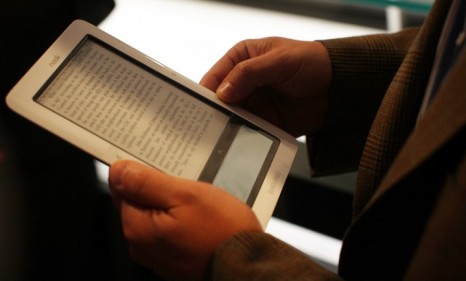Why Borders failed and Barnes & Noble hasn't: 4 theories
One mega bookseller is shuttering all of its stores, while the other has found its Nook

A free daily email with the biggest news stories of the day – and the best features from TheWeek.com
You are now subscribed
Your newsletter sign-up was successful
On Monday, Borders announced that it would liquidate its remaining 400 stores in an effort to pay off creditors, quashing any hope that the 40-year-old, bankrupt bookstore chain would rise again. "The truth is that Borders has been facing headwinds for quite some time, including a rapidly changing book industry, eReader revolution, and turbulent economy," company president Mike Edwards wrote in a letter to employees. "We put in a valiant fight, but regrettably, in the end we weren't able to overcome these external forces." And yet, Borders' main competitor, Barnes & Noble, has managed to survive, if not exactly thrive (it put itself up for a sale a year ago and has had only one interested buyer). Where did Borders go wrong? Here, four theories:
1. It made a fatal deal with Amazon
In 2001, Borders cut a deal with Jeff Bezos & Co. to have Amazon.com run its website, which may have been the beginning of the end, says Matt Townsend at Bloomberg. "I remember thinking this is the weirdest thing… and [that] it was the last thing we wanted to do," says Manish Vyas, then a manager of Borders' online unit. "It ended up being a customer-harvesting vehicle for Amazon." Divorced from its online component, Borders continued to expand its brick-and-mortar locations until, finally in 2008, the bookseller debuted its own website. Too late: Amazon had already gobbled up a massive chunk of online market share and released the first Kindle.
The Week
Escape your echo chamber. Get the facts behind the news, plus analysis from multiple perspectives.

Sign up for The Week's Free Newsletters
From our morning news briefing to a weekly Good News Newsletter, get the best of The Week delivered directly to your inbox.
From our morning news briefing to a weekly Good News Newsletter, get the best of The Week delivered directly to your inbox.
2. Borders made a losing bet on CDs and DVDs
Borders "went heavy into CD music sales and DVDs, just as the industry was going digital," and "Barnes & Noble was pulling back," says investment researcher Peter Wahlstrom, as quoted by NPR. Borders' "big bet in merchandising" turned out to be a losing one. In 2006, CD and DVD sales generated $600 million in sales for Borders, 17 percent of its revenue, notes Townsend. By 2009, iTunes had taken over, and sales of CDs and DVDs at Borders had fallen by 28 percent.
3. It jumped on the e-book train too late
Amazon released the first Kindle in 2007, while Barnes & Noble followed up the next year with its Nook e-reader. By the time Borders finally decided to get into the e-book biz, it was too far in the red to spend much money on devising a digital strategy. Instead, it outsourced the problem to Kobo Inc., a Canadian e-reader company, and started selling their wares in 2010. Just last week, Borders shops displayed a "great big table of Kobo readers," says Harry McCracken at PC World. "But it was clearly far too little, far too late."
A free daily email with the biggest news stories of the day – and the best features from TheWeek.com
4. Borders built too many stores
Even "if e-books didn't exist, I'm pretty positive that Borders would have still collapsed in much the same way," says McCracken . "While Borders was busy giving the web and e-books short shrift, it was also doubling down on the notoriously tricky business of running brick-and-mortar superstores." Late last year, I counted four Borders stores in San Francisco, and three were no more than a mile and a half apart. "I'm no retailing genius, but I couldn't figure out how the city could support so many giant bookstores in so little space." Barners & Noble, by comparison, has only one store in the city.